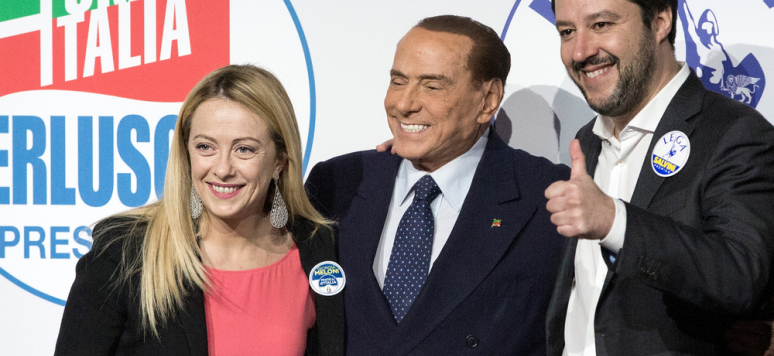Briefings de l'Ifri - Putin’s Friends? The Complex Balance Inside Italy’s Far-Right Government Coalition Briefings de l’Ifri, November 28, 2022
Publié le 28/11/2022

Giorgia Meloni, leader of Brothers of Italy, Silvio Berlusconi, leader of Forza Italia and Matteo Salvini, leader of the League
Credits: Alessia Pierdomenico/Shutterstock
Italy’s new far-right government has been widely perceived as the potential weak spot of the anti-Kremlin European front following Russia’s invasion of Ukraine: traditionally pro-Putin politicians such as Matteo Salvini and Silvio Berlusconi are back in power. Yet, after Mario Draghi’s hawkish Euro-Atlantic government fell in July and Giorgia Meloni was looking forward to a probable victory, she immediately sided with the European Union and the North Atlantic Treaty Organization in a firm condemnation of Russia.
Key takeways:
- Italy’s good relations with Putin’s Russia have not been the prerogative of a specific party. Political, economic and energy ties developed significantly with center-left and center-right governments alike.
- In line with most far-right parties in the EU, Salvini’s Northern League and Meloni’s Brothers of Italy developed an appreciation for Putin’s neo-conservative regime while criticizing the EU and NATO for damaging Italy’s entente with Moscow.
- A potential reconciliation with Moscow goes against Italy’s national interest at this point. Russia accounts for only 1.5% of Italy’s exports against its Western partners’80%. Besides, the EU’s interconnected gas market requires a coordinated plan to overcome the energy crisis. Finally, the reconquest of Kherson by Ukraine in November makes support for the Kremlin political suicide.
- Meloni’s sudden pro-NATO shift has taken much of her electorate by surprise, while support for Ukraine is low in the country. Coalition allies Salvini and Berlusconi are ready to take advantage of this gap to weaken Meloni’s leadership. This is typical of Italy’s fragile parliamentary democracy. To avoid further disappointing her electorate, Meloni is rapidly satisfying other demands of theirs, on issues such as migration, family values and tax policies.
Raimondo Lanza is a political analyst specialized in Russia and the Post-Soviet Space.
